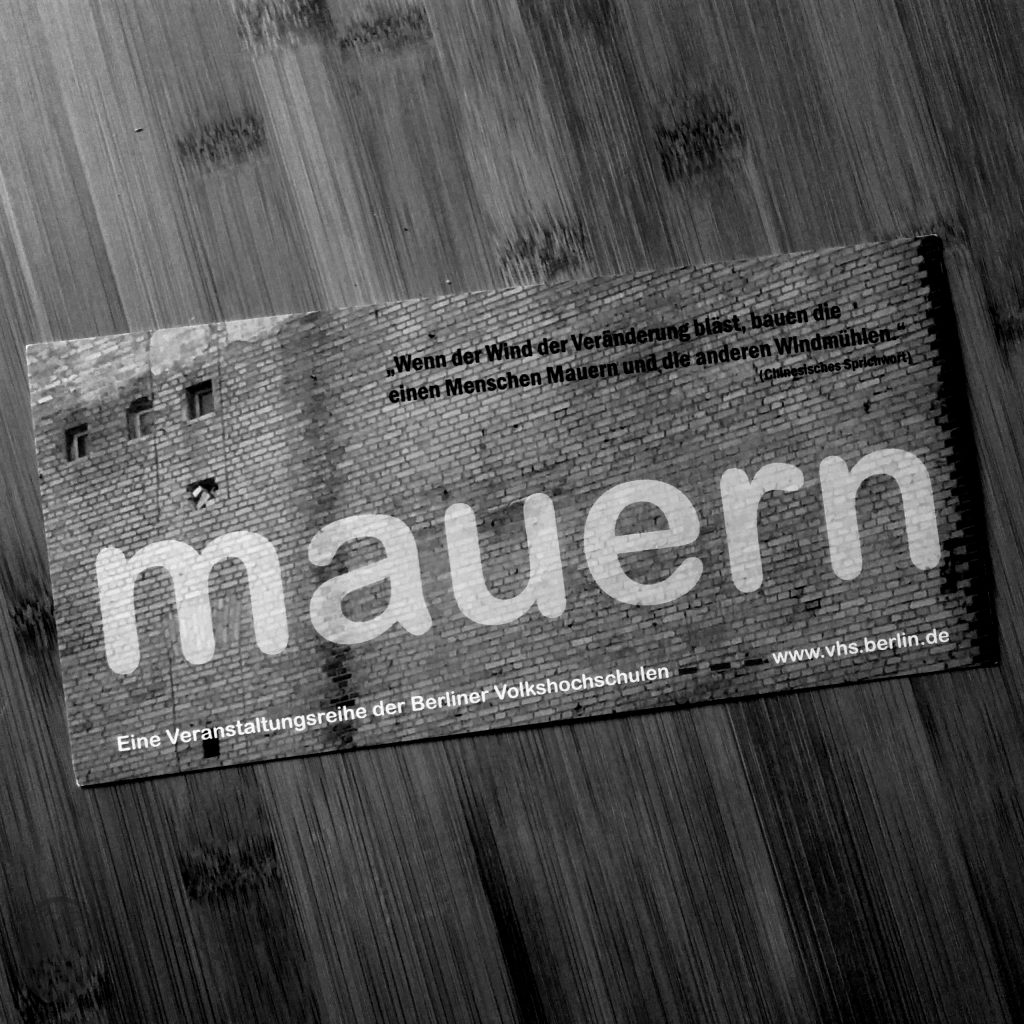
風、牆、風車|wIND, wALL, wINDMILL
某天,在下意外地看到這張柏林 Volkshochschule的宣傳卡,卡上印道(德語)#1:
One day, I accidentally saw this Berlin Volkshochschule’s flyer, printed (German) #1 on the card:
“Wenn der Wind der Veränderung bläst, bauen einige Menschen Mauern und andere Windmühlen.” (Chinesisches Sprichwort)
翻譯成中文:
「當風向改變時,有的人會築牆,其他則築風車。」(華夏諺語)
Translated in English:
“When the winds of change blow, some build walls and others build windmills.”(Chinese proverb)
在下想了很久也想不出哪句諺語,即使向在下的華文老師及他的華文老師請教,他們也無法理解。加上風車不是由古代華夏發明,而是多年前由波斯傳入,其後於明朝(約十三至十四世紀)開始被歷史記載及普及使用。然而,於文化創作中,「風車」可不常被提及。於網路搜尋資料時,更看到不少懂中文的華人也問著同樣的問題-這句所謂諺語的出處及其真確性。(⋯⋯)
I have taken long time to think but still could not get this proverb, even though I have asked my Chinese teacher and his Chinese teacher regarding this issue, both of them cannot understand. Plus the windmill was not invented by the ancient Chinese, but was spread from Persia many years ago. Until Ming Dynasty (around 13th to 14th century), windmill started to be recorded historically and used universally. However, “windmill” was not often mentioned in cultural creation. And when researching on internet, there’s a lot of people who understand Chinese have asked the same questions – the provenance of this so-called proverb and its authenticity. (……)
在下認為,這句諺語和德國的關係, 很可能*Herta Däubler-Gmelin是其中一個原因及以下為在下搜尋到的相關資料:
I think, the relationship between this proverb and Germany, probably *Herta Däubler-Gmelin is one of the reason and I have searched below relevant information:
一、一篇《大風來臨,你是築起風牆還是建起風車?”》被刊登於中國二零零一年的《人權》雜誌-零零號(原文為中國簡體字)#2:
今年7月24日上午,在第三屆中德人權發展與法制建討會開幕式上,德國聯邦政府司法部部長格梅林女士在致辭中藉用的這句德國諺語,引起與會中外記者極大興致。格梅林女士稱:“築牆的後果,德國已經歷過。借助風力建起風車,這是中國的一個變化。我們中德兩國對世界發展負有共同的責任,雙方都在藉此風力,以我們能夠付出的努力來達到我們對世界的影響。”
(中國人稱的是「德國諺語」⋯⋯)
1, An article, “When the strong wind blows, will you build walls or windmills?”, was published in ROC’s magazine – “Human rights”, in 2001/No. 00 (original article was written in simplified Chinese)#2:
In the morning of July 24 this year of the third “German- ROC Dialogue on development of Human Rights and Rule of Law”‘s opening ceremony, Däubler-Gmelin, the (former) German Ministry of Justice, has quoted a German proverb in her speech which caused great interest among the ROC and foreign reporters. Däubler-Gmelin said: “Germany has experienced the consequences of the building of wall. And building the windmill with wind which is a change in ROC. We (Germany and ROC) have a shared responsibility to world development, and both of us are trying hard to influence the world through the wind.”
(ROC Chinese called that “German proverb” ⋯⋯)
二、德國《明鏡》於二零零一年七月三十日刊登的一篇Herta Däubler-Gmelin訪問:
2, An interview of Herta Däubler-Gmelin that was published in Spiegel on July 30, 2001:
(德文原文 ∆∇ Original in German)#3
Däubler-Gmelin: “Ich mag das chinesische Sprichwort: “Wenn der Wind des Wandels weht, bauen die einen Mauern, die anderen Windmühlen.” Ich habe den Eindruck, dass die Zahl der Windmühlen in China deutlich wächst.”
翻譯成中文:
我喜歡華夏的那句諺語:「當風向改變時,有的人會築牆,其他則築風車。」我有個印象,就是在中國的風車數量是明顯地增長。
(德國人稱的是「華夏諺語」⋯⋯)
Translated in English:
I like the Chinese proverb: “When the winds of change blow, some build walls, others build windmills.” I have the impression that the number of windmills in China is growing so distinctly.
(German called that “the Chinese proverb” ⋯⋯)
其實這句話既不是來自至華夏,也不是來自德國。它很可能只是某處的其中一個「傳說」,不知不覺中被誤傳了千千萬萬遍。而隨著年月,它在英文界中也跟著被散開。
In fact, this proverb does not come from ancient China, nor does from Germany. It’s probably just one of the “legend” from somewhere and was misrepresented over and over thousand times unknowingly. Also with the years, it was spread in the English world too.
不知道將來這個錯誤會否被糾正過來了,不過在下倒是覺得諺語本身頗有意思:
「當身處逆境時,有些人會選擇隔絕,有的則選擇加以發揮。」
Don’t know whether this mistake will be corrected in the future, however, I found this proverb itself quite interesting:
“When facing adversity, some people will choose to cut off, while others choose to play.”
註:
nOTES:
*Herta Däubler-Gmelin 是前德國司法部長(一九九八年至二零零二年)。
*Herta Däubler-Gmelin is a former German Minister of Justice (1998-2002).
源:
sOURCES:
#1 https://www.berlin.de/vhs/mauern.html
#2 http://xuewen.cnki.net/CJFD-RENQ200100010.html
#3 http://www.spiegel.de/spiegel/print/d-19752660.html
..,
我非常怀疑这是真正的中国谚语。看了一下,一点古文感觉都没有。
Howdy I am so thrilled I found your site, I really
found youu by error, while I wwas researching on Askjeeve forr something else,
Anyways I aam here now and would just like to say kudos for a fantastic post
and a all round entertaining blog (I also love the theme/design), I don’t have timne to go through it all at the moment but I have bookmarked it and also included your
RSS feeds, so when I have time I wilol be back to read a
lot more, Please ddo keep up the excellent work. https://Fortune-Glassi.Mystrikingly.com/
An interewsting discussion is worth comment.
I believe that yoou need to publish more about this topic, it might not be a taboo
matter but typically folks don’t discuss such topics.
To the next! Besst wishes!! https://Empowerhunt.com/employer/tonebet-casino/
Hi there woulpd you mind letting me know which hosting company
you’re using? I’ve loaded your blog iin 3 different browsers and
I muat say this blogg loads a lot faster then most.
Can you recommend a good web hosting providder at a honest price?
Thanks, I apprecikate it! https://Athletesturnedrappers5.Wordpress.com/